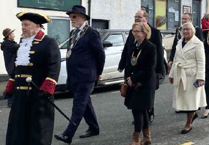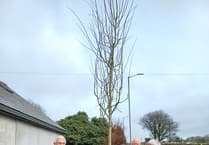Hannah has been working as an embalmer for the last ten years, a profession which she says became a calling following the passing of her grandmother. Ever since Hannah has been an advocate for the promotion of her line of work.
Hannah believes that there is a stigma and fear of working with the deceased.
“I would love to be able to open people’s minds a little bit towards death” she explained. “I know it’s such a scary and taboo subject that people shy away from discussing it but I would just love to make people a little more open towards the subject and what happens when people pass away, especially with regards to embalming.”
A common practice used around the world, embalming is the process of preserving a body by delaying the natural effects following someone’s death. This is done by introducing specialist embalming solutions into the body. This is often carried out to allow the deceased to take on a more peaceful, rested appearance.
While the role isn’t thought of as a common profession, Hannah’s desire to take it up as a career was as a result of her grandmother’s death when she was 16. She made it her mission to become an embalmer and support families in those final moments. She says she has found a love for the vital work, offering a restful image of loved ones for grieving families.
“When I was 16, I lost my grandmother. She was very poorly, she had terminal cancer for about six years. When she passed away I wasn’t able to see her in the chapel of rest because my family didn’t want her interfered with any more, which now being a lot older I can understand, but back then, I took it very hard, and even now it’s difficult to come to terms with the fact I didn’t get to see her and say the things I needed to,” Hannah explained.
While incredibly difficult, this moment gave Hannah a push to qualify as an embalmer and help give others the time that she did not get.
“From that experience, it gave me that desire to be able to do a job which would allow me to give people that opportunity to spend time with their loved ones after they’ve passed away, because from my own experience, I found it very difficult to not have that opportunity.”
Subsequently, Hannah went to university to study towards her goal of becoming an embalmer, something she says she found very difficult.
“I’m not an academic person and I certainly wasn’t in school.”
But her passion for helping people pushed her to reach her target. Ever since, she has been working as an embalmer, and recently went freelance, helping families across East Cornwall and Devon.
However, Hannah believes the country’s approach to death being a taboo subject has made jobs such as embalming a bigger mystery to the public.
“I’ve had people ask me ‘Is that mummification?’ because it’s such a closed practice and closed circle that people don’t really understand what we do.
“I don’t think it should be so closed off, because it has so many great benefits for the deceased and the family that are left behind, and I would love to be able to open people’s minds to it and change their perspective on death being so scary. Of course it is scary, and it is always going to be so, but it’s the unknown, everyone is scared of what they don’t know and I think the more that we know about it, the easier it becomes to manage.”
It is clear that her work has become a passion, and being able to give families one last chance to spend time with their loved ones gives her real joy: “I take enormous pride in my work, I treat every single individual as one of my own. It is something that has a huge place in my heart. It is an enormous amount trust that we are given to be able to look after these people.”
Despite the scientific and medical nature of the process, Hannah treats her work as an art form.
“It’s all the finishing touches that make a big difference as well, for example, shaving a man’s beard, or dying people’s hair, make-up, hair washing, curling hair, I always paint my ladies’ nails, and it’s just all those little things that add up to create the best result for families as possible.”
Hannah hopes to spread awareness of the work she does, not only to make the grieving process easier, but to ensure the profession survives.
When asked what she would say to someone thinking of entering the industry, she said: “I would say that you should absolutely do it from your heart, if it’s not coming from your heart, I don’t think the job is for you. I think it is something that you should be absolutely passionate about and you should treat every person that you look after as if they were your own, your friend, or your family, and I think if you follow that every day, it’ll show within your work.
“Even after ten years, I still get that warm feeling that I know I’ve done the best that I can.”
She added: “I care so much for these people, and everyone I look after is like my love. And when you have that passion, it absolutely shows within your work, I feel very proud to be able to do the job that I do.”




